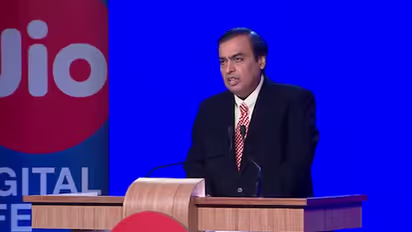Reliance Jio posts Rs 270.6 crore loss

Synopsis
The company said 19.5 million subscribers were added in the reported quarter. Jio registered customer churn of 1 per cent and said that the number is "expected to reduce further", the statement said. Jio said that data consumption on its network reached 9.62 gigabyte (GB) per user per month and voice consumption stood at 626 minutes per month.
Reliance Jio today posted a loss of Rs 270.5 crore for the quarter ended September 2017, against Rs 21.3 crore loss in the preceding June quarter. Jio commenced its commercial operations in September 2016 and its loss during the quarter stood at Rs 3.9 crore.
Total income of Reliance Jio from operations came in at Rs 6,148.7 crore in the September quarter against Rs 0.30 crore notched during the first quarter of the current fiscal.
The company reported EBITDA (earnings before interest, taxes, depreciation and amortisation) of Rs 1,443 crore in July-September 2017 period with margin pegged at 23.5 per cent.
However, analysts say that the Reliance Jio Infocomm could post a net profit next fiscal on the back of strong user additions and higher average revenue per user (ARPU).
Jio recorded 138.6 million subscribers on its network to be the countrys largest mobile data subscriber base in the quarter under review, as per the companys statement.
The company said 19.5 million subscribers were added in the reported quarter. Jio registered customer churn of 1 per cent and said that the number is "expected to reduce further", the statement said.
Jio said that data consumption on its network reached 9.62 gigabyte (GB) per user per month and voice consumption stood at 626 minutes per month. The company reported 178 crore hours of high speed video consumption per month.
The average revenue per user of Jio during the quarter stood at Rs 156.4 per month. Giving its operational matrix, the company said total wireless data traffic stood at 378 crore GB during the quarter while the average voice traffic stood at 267 crore minutes a day.
The Jio numbers come at a time when the sector is complaining of financial stress, and revenues and profits of the older telcos have taken a beating. Incumbent operators Airtel, Idea, and Vodafone have blamed the free offers by the newcomer for the failing health of the industry, that, as per some estimates, has a cumulative debt of Rs 4.5 lakh crore.
The Telecom Commission -- the highest policy making body of the Department of Telecom -- has recently approved recommendations of an inter-ministerial group proposed to bring some relief to the sector. A major recommendation cleared by the Telecom Commission and now headed for Cabinet approval includes giving six more years to telecom companies to pay for the spectrum they bought in auctions.
Adding to the financial worries of old operators, the telecom regulator has slashed the domestic mobile termination charges by nearly 58 per cent to 6 paise a minute, prompting many operators to approach the courts against the TRAI decision.
The tariff war has also accelerated the consolidation in the industry and large operators are either combining forces (Idea-Vodafone) or acquiring smaller players (Bhartis acquisitions of Telenor and now the consumer mobile business of Tata Group) to protect their turf.
With inputs from PTI
Find the latest Technology News covering Smartphone Updates, AI (Artificial Intelligence) breakthroughs, and innovations in space exploration. Stay updated on gadgets, apps, and digital trends with expert reviews, product comparisons, and tech insights. Download the Asianet News Official App from the Android Play Store and iPhone App Store for everything shaping the future of technology.